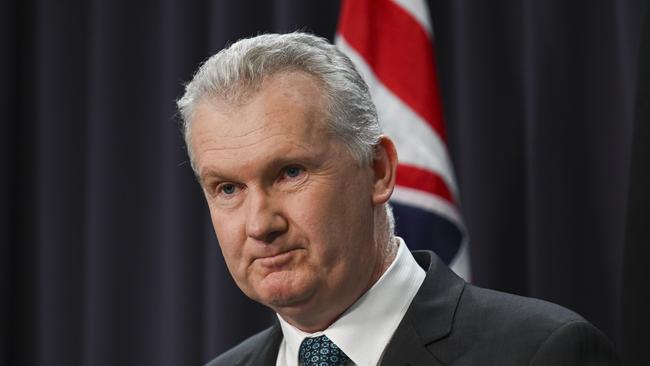Home Affairs allowed 66 criminals to stay in Australia under Direction 99
Home Affairs opted not to cancel the visas of 66 criminals – including child sex and rape offenders – under Direction 99, with Tony Burke facing fresh demands to review the decisions.

Home Affairs opted not to cancel the visas of 66 criminals – including child sex and rape offenders – under Direction 99 over 13 months, with new Immigration Minister Tony Burke facing fresh demands from the Coalition to review the department’s decisions.
Those allowed to stay in the country included 12 people convicted of assault, 10 with an association with bikies or other organised crime groups, seven people convicted of drug offences, a further seven convicted of domestic violence offences and another five convicted of theft, robbery or break and enter.
According to a new breakdown provided by the Department of Home Affairs of data from March 2023 to April 2024, the cohort of 66 criminals also included less than five child sex offenders, less than five rape and sexual offenders and less than five armed robbery offenders. For these categories, the department did not provide a specific number. Over the same period, Home Affairs still cancelled 695 visas on character grounds.
Former immigration minister Andrew Giles previously said the intention of Ministerial Direction 99 was not being followed by the Administrative Appeals Tribunal, and that some of the tribunal’s decisions were “very hard to reconcile with any sense of the expectations of the Australian community”.
But the new Home Affairs figures reveal government decision-makers were allowing large numbers of criminals to stay in the community.
The latest update was provided in response to questions on notice lodged by Liberal senator Paul Scarr and come on top of the 97 cases already identified by The Australian in which the AAT overturned visa cancellations based on Direction 99. Taken together, the actions of the Home Affairs Department and the AAT mean at least 163 dangerous individuals have been allowed to remain in Australia as a result of decisions informed by the contentious ministerial direction.
Mr Burke told The Australian he had already moved to look into the 66 cases and whether the decision to allow individuals to remain in the community was appropriate.
“I have asked my department to start the process for these individuals to be reassessed. Community safety comes first,” he said. “Ministerial Direction 99 has been replaced by Ministerial Direction 110, which emphasises to decision-makers at the department and AAT that community safety is the highest priority for the Australian government. Ministerial Direction 99 is no longer in effect.”
Opposition immigration spokesman Dan Tehan told The Australian Mr Burke now had the “opportunity to finally be honest with the Australian people about the size of the mess caused by Labor’s Ministerial Direction 99, and to apologise for the mistake”.
Signed by Mr Giles in January 2023, Direction 99 entered into force on March 3 last year and provided guidance to decision-makers considering visa cancellations under section 501 of the Migration Act.
It required them to weigh up the “strength, nature and duration of times to Australia” as a “primary consideration”. It was replaced on June 21, 2024 by Direction 110, which made clear “the safety of the Australian community is the highest priority of the Australian government”.
The change followed months of pressure and stories from The Australian lifting the lid on how dozens of criminals – including a man who sexually assaulted a woman with Down syndrome – had been spared deportation in the wake of Direction 99.
Sudanese-born Emmanuel Saki, allowed to remain in the community after the AAT overturned his visa cancellation in March, was charged with murder after allegedly stabbing a 22-year-old in the chest on Mother’s Day in southern Brisbane.
Responding to this development in late May, Mr Giles recancelled Saki’s visa – which was initially cancelled in 2019 after he was convicted of choking his former partner unconscious – and ordered a review on the number of visas that had been reinstated.
Mr Tehan told The Australian there was now a new urgency for the government to reveal how many individuals allowed to stay under Direction 99 had been charged with new crimes.
“We know one criminal non-citizen allowed to stay in Australia because of Direction 99 has since been charged with murder, how many more have reoffended?” he said. “Will Minister Burke review these departmental decisions to ensure there were no egregious cases like the ones already revealed?”
New questions have already emerged over the effectiveness of Direction 110, given it still requires decision-makers to “afford a higher level of tolerance of criminal or other serious conduct by non-citizens who have lived in the Australian community for most of their life”.
The Australian has revealed that two of six AAT cases assessed under Direction 110 to date have already succeeded in having their visa reinstated.
These include Philippines-born Earl Sanchez, sentenced last year to three years’ imprisonment for aggravated sexual intercourse with a child, prompting the automatic cancellation of his visa, and a 39-year-old Lebanese man – identified only as KCKJ – sentenced to four years and two months’ jail for the unlawful supply of MDMA and cocaine.
Mr Burke told Sky News on Sunday he would make as many applications for preventive detention orders as possible for the dangerous non-citizens released into the community following the High Court’s landmark NZYQ decision last year.
However, he said there was a high threshold for the government to successfully obtain a court order under the regime that was legislated late last year amid criticism of Labor’s handling of the NZYQ decision. “There’s a lot of work that’s been done in building up the cases. Once the High Court made the decision … the threshold became high to be able to successfully launch a case.”




To join the conversation, please log in. Don't have an account? Register
Join the conversation, you are commenting as Logout